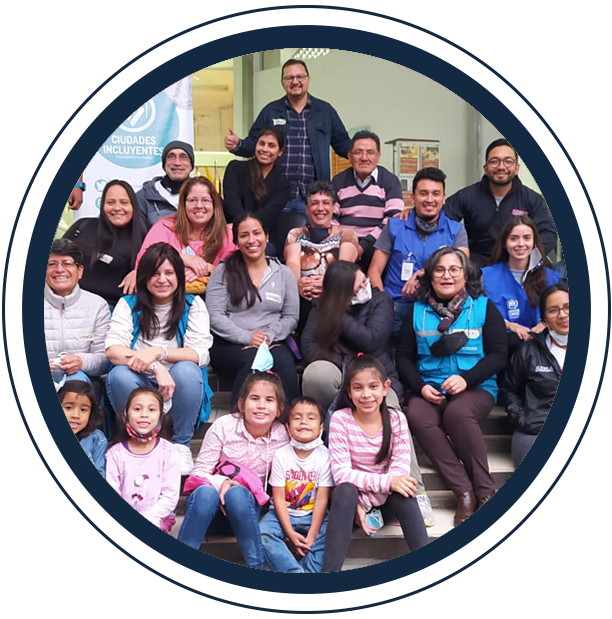The cities and communities involved in the project will have a space to share and learn about experiences and best practices both regionally and globally, and will have a systematization that will allow them to appropriate the experience and replicate it in other territories.

The local government, the community, and local strategic allies have experiences of good practices for the integration of refugees and migrants in the city.
The local government, the community and local strategic allies have experiences of good practices for the integration of refugees and migrants in the city. We share some of these experiences below:
1. Implementation of minimum distances in public meeting and connectivity spaces in the Metropolitan District of Quito, during the Sanitary Emergency. During the Sanitary Emergency, the Secretariat of Territory, Habitat and Housing has been developing technical rules to implement distancing measures in different areas of the city, in order to gradually reactivate the use of certain spaces, ensuring a safe and healthy coexistence among citizens.
– The impact of migration on Latin American cities, on the way to the X World Urban Forum in the framework of the XII Global Forum on Migration and Development in Quito, on January 21, 2020.
2. Implementation of specific measures for the installation of ParQuitos and terraces for the gradual return of activities in the Metropolitan District of Quito during the Sanitary Emergency.
For the gradual return of economic activities during the Sanitary Emergency, the importance of maintaining minimum distances and reducing the capacity of the different establishments has been established; in this sense, the Municipality of Quito offers the possibility of “expanding” its commercial spaces into the public space with terraces and/or ParQuitos. The implementation of activities in the streets is important for the security, maintenance, control and correct functioning of the public space in general.
3. Metropolitan Ordinance of Economic Reactivation and Employment Promotion to mitigate the economic effects of the construction sector in the Metropolitan District of Quito.
The construction sector activated a significant network of jobs in the economy of the cities, so through this proposed Metropolitan Ordinance we sought to streamline the return of the construction sector activities with simplification of municipal procedures and incentives for new and ongoing works.
4.Circuito Cumbayá: Bottom-up methodology to involve the community in the development of the space and implement their ideas.
The Cumbayá Urban Laboratory is a project that seeks to generate a pedestrian priority zone to support the socioeconomic reactivation of the sector.
5. Emphasizing the cultural importance of the neighborhood and the public space so that the entire population could enjoy it.
This case is located in the passages and streets of the Chimbacalle sector, where there are high levels of insecurity.
6. Promoting and guaranteeing the exercise of the rights of the population with experience of life on the street, through intervention strategies with a human rights approach.
How to provide specialized services for socio-family and economic linkage under the principle of dignity, together with the promotion of family and community co-responsibility?
7. “Emprende Seguro”, a program that uses ILO proprietary methodologies to boost the economy and well-being of migrants in host communities,through entrepreneurship training to improve business development.
8. Identification of projects that integrate vulnerable populations through artistic products.
For young people and adolescents from 12 years of age who are in situations of vulnerability or begging. It is an inclusive project that has helped more than 50 people with disabilities, about 150 people in a situation of human mobility, about 80 people with LGTBIQ+ identity, and more than 120 people of different ethnic self-definition.
9.Using CEO Coaching as a transversal learning methodology, participants will learn the correct preparation of the resume and other fundamental elements in the job selection process.
Psycho-technical guidance for effective performance in job interviews, access to job portals and applications for job offers, as well as tips to improve soft skills.
10. Offering opportunities in relation to the needs of the communities. Local organizations can make use of Casa Somos’ infrastructure and organization to coordinate efforts to carry out new projects.
The opportunities and workshops implemented include training in artisanal ice cream making, mini chef, fruits and chocolates, capoeira, theater and performing arts, balloon art, and tropical dance. Casa Somos identified the lack of student programming as a problem and solved it by offering public activities.
11. Free workshops, classes, and sports for young people to encourage the use of public spaces.
Using public space, young people can have fun, express themselves, and develop their art while enhancing their personal growth. Casa Metro coordinates public performances such as concerts, assemblies, and readings to integrate the community and take advantage of public space.
The project facilitates spaces for the socialization of experiences on the integration of refugees and migrants in cities.
– Inclusive Cities Meeting: Actions of local governments for the integration of Venezuelan refugees and migrants and socioeconomic and territorial reactivation post Covid-19, held on June 7.
– International Webinar “Human mobility in the urban-rural sphere in the times of Covid-19” with the participation of Elisa Montoya on behalf of the Mayor’s Office of Cúcuta.
– The challenges of integrating refugees and migrants who wish to remain in Latin American and Caribbean cities: a social, economic and urban perspective. If you want to know more click here
Emergency and post-emergency phase
Emergency and post-emergency phase
Emergency and post-emergency phase